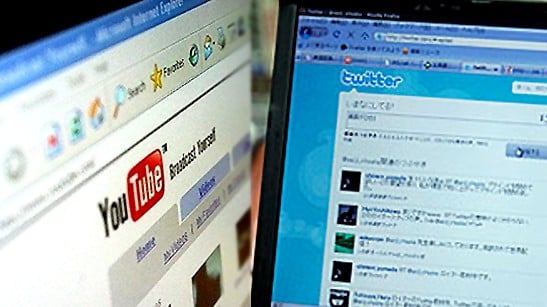
Days after the botched attack which killed nine Turks, the fight over what exactly happened on board the ferry is still raging on YouTube, with both sides posting more and more clips on the video-sharing website to support their case.
It was chaotic footage of Israeli troops storming the Turkish-owned Mavi Marmara which first caught the world's attention. Streaming Internet video of bloodied passengers and reporters issuing urgent calls for help were transmitted in real time from the deck of the ship.
The commandos eventually disconnected the feed but the damage was done, provoking a wave of global outrage which has dealt a harsh blow to Israel's image.
Israel says its troops were violently attacked as they dropped onto the Mavi Marmara, and only shot back in self-defence. The activists say the commandos started shooting as soon as they arrived, prompting those on board to act in self-defence.
Faced with a diplomatic backlash, Israel cranked up its propaganda machine, uploading a slew of video clips to YouTube to support its version of events. Grainy images of elite commandos taking a beating at the hands of Turkish activists turned out to be one of Israel's most unlikely propaganda successes.
"Over 1.6 million people watched that footage. You also saw it used on blogs and in forums," said Lieutenant Aliza Landes, head of the Israeli military's new media desk. In another clip, taken from the ship's security cameras, activists can be seen preparing for a confrontation. "In that footage you can see them handing out metal batons and putting on masks, and you can see the light of the boat approaching so it's clear that they were preparing for a fight," said Landes. "YouTube is the best tool we have as video gives the most powerful information," said Landes.
Israel using "pirated" footage
Israel has, however, come under fire for using "pirated" footage to defend its botched raid - material confiscated from journalists who were on board the ship.
An interview with a passenger who says he wants to be "a martyr" is shown in a clip not credited to any media outlet, and only described as "footage captured on the Gaza flotilla."
The army refused to say whether the footage would be returned.
Twitter battle
Twitter has also been widely used by both sides, with the microblogging site flooded with Tweets as the raid happened, most of them posted by the flotilla organisers commenting on the live Internet feed. But none of the Tweets actually originated from the boat.
And Israel has so far only used the service to distribute official information rather than as a breaking news tool. Chaim Shacham, director of information at the foreign ministry, says Israel is becoming more aware of the digital media battlefield. "In this case, it was very clear to us that it would be a race for footage," he told AFP, saying that the navy had cameramen in the helicopters and patrol boats.
Getting footage was part of the operational plan, he said. All the clips put out by Israel have been rigorously edited, have no timestamp and show only scenes which vindicate the Israeli account without explaining what happened before, or after.
Shacham dismisses claims the footage provides a distorted image of events. "The footage from the ship immediately put things into context - it told the story of the soldiers as well as the protesters, clearly showing the soldiers rappelling down and getting beaten," he said.
While some of the footage had not been very "convenient" for Israel, much of it vindicated the troops' account, said Shacham. "The Arabic and Turkish footage is very revealing: it shows the jihadists on the ship were intending to beat the hell out of the soldiers," he said, pointing to interviews with Bulent Yildirim, head of the Turkish charity IHH.
But analyst Yariv Ben Eliezer believes Israel's online efforts were too little, too late. "We lost the propaganda war before we even started," said Ben Eliezer, a propaganda management expert at the IDC centre in Herzliya. "We are considered by the world to be Goliath and the 'humanitarian' activists are considered to be David, so it's a lose-lose situation."
Israel, he says, should have done its homework and exposed activists aboard the ferry as "extremists" long before they set sail. "It's not effective now because nobody wants to listen."






1735203131-0/Untitled-design-(7)1735203131-0-270x192.webp)
1735199120-0/Untitled-design-(100)1735199120-0-270x192.webp)


1735195617-0/Untitled-design-(99)1735195617-0-270x192.webp)
1735025557-0/Untitled-(96)1735025557-0-270x192.webp)











COMMENTS
Comments are moderated and generally will be posted if they are on-topic and not abusive.
For more information, please see our Comments FAQ